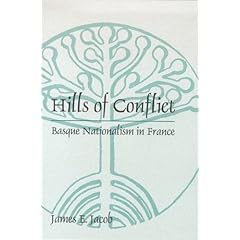
Basque nationalism is a movement with roots in the Carlism and the loss by the laws of 1839 and 1876 of the Ancien Regime relationship between the Basque provinces and the crown of Spain when the Spanish government revoked part of the fueros after the Third Carlist War. The fueros acted as part of the Basque legal system and dealt with matters pertaining to the relation of the Basque Provinces with the crown. The fueros were charters given by the successive kings of Castile. The Fueros gave Basque citizens a privileged position in Spain with special tax and political status; basically, Basques were not subject to direct levee to the Castilian army, although many volunteered, especially in the navy.
During the 19th century, the reactionary Fuerista movement pleaded for the maintenance of the Fueros and territorial autonomy against the liberal centralizing pressures.
Basque Nationalism was born much later. The chief ideologist of early Basque nationalism is Sabino Arana, founder of the Basque Nationalist Party. By the end of the 19th century, Arana created an ideology centred on the purity of the Basque race and its moral supremacy over other Spaniards (a derivation of the system of limpieza de sangre of Modern-Age Spain), anti-Liberal Catholic integrism, and deep opposition to the migration of other Spaniards to the Basque Country starting during the first stages of the industrial revolution.
In the early 20th century, Basque nationalism developed from a nucleus of petty bourgeois enthusiasts (non-native Basque speakers) in Bilbao to incorporate the peasant basis of Carlism in Biscay and Guipuscoa. The movement survived without any problems the dictatorship of Miguel Primo de Rivera under the guise of cultural and sportive associations.
Basque nationalism managed to substitute Carlism in the favour of the Catholic church as a barrier against leftist anti-clericalism.
Several splits and reunions were caused by clashes of personalities over different desires for the status of the Basque Country (autonomy versus independence). There were also leftist versions, though the Basque working class (many of them immigrants) was divided among the communist and socialist movements. The ELA-STV Catholic trade union tried to diffuse nationalism within the workers, but its influence was minor, until the Spanish transition to democracy.
In 1936, the main part of the then Christian democrat PNV sided with the Second Spanish Republic in the Spanish Civil War; the promise of autonomy was valued over the differences on religious issues with the Popular Front.
However, in 1937, roughly halfway through the war, Basque troops, then under control of the Autonomous Basque Government surrendered in an action brokered by the Basque church and the Vatican in Santoña to the Italian allies of General Franco on condition that the Basque heavy industry and economy was left untouched.
Thus began one of the culturally hardest periods of Basque history in Spain, due to massive immigration of non-Basque speakers and the prohibition of the Basque language for some years. At the same time it was one of the most economically prosperous periods, due also to the protectionist measures by the Franco regime.
For many leftists in Spain the surrender of Basque troops in Santoña (Santander) is known as the Treason of Santoña. Many of the nationalist Basque soldiers were pardoned if they joined the Francoist army in the rest of the Northern front. Basque nationalists submitted, fled (the political leaders), went underground or to prison. Small groups fled to the Americas, France or the Benelux, of which only a minority returned after the restoration of democracy in Spain in the late seventies, or before.
ETA was created in the 50s by young nationalists. During the 60s, Marxists took over the organization. They turned it into a revolutionary organization, fighting to obtain an independent and socialist Basque country from then Francoist Spain, inspired in movements like those of Castro in Cuba or Ho Chi Minh in Vietnam.
Ever since Spain regained democracy in 1978, autonomy was restored for the Basques, achieving self-government without precedent in Basque modern history. Thus, based on the fueros and their Statute of Autonomy, Basques have their own police corps and manage their own public finances with virtually no intervention from the central government of Spain. The Basque Autonomous Community has been led by the nationalist Christian democrat PNV ever since it was reinstaured, in the early 1980s, to date. In Navarre, Basque nationalism has not succeeded, to date, to win the elections held to run the government of the Autonomous Community, but different Basque nationalist parties do run in a number of municipalities.
Unlike Spain, France is a centralized State, but a Basque nationalist party has a presence in some municipalities through local elections.
Basque nationalist organizations
Unión del Pueblo Navarro is party exclusive to the southern Basque Country but they oppose Basque nationalism. Is a part of Partido Popular (PP) in Navarre. All major Spanish parties have their Basque branches.
Acción Nacionalista Vasca, leftist political party
Aralar, leftist political party
Askatasuna, support for ETA prisoners.
Batasuna, leftist political party, illegal in the southern Basque Country
Batzarre
Comunión Nacionalista Vasca, former political party
ELA-STV, trade union
Enbata
ETA, violent revolutionary clandestine organization operating mainly in the southern Basque Country
Etxerat, support for Basque political prisoners
Euskadiko Ezkerra, former leftist political party
Euskal Ezkerra, a splinter of Euskadiko Ezkerra.
Eusko Alkartasuna, Social-Democratic political party
ESAIT, support for the Basque National teams in different sports
Gazte Abertzaleak, the youth group of the Spanish Basque political party Eusko Alkartasuna, left of the PNV but not aligned with ETA or Batasuna
Gestoras pro-Amnistía, support for ETA prisoners.
Herria 2000 Eliza, Catholic movement
Ikasle Abertzaleak, Group of Basque nationalist students
Iparretarrak, violently clandestine organization operating in the French part of the Basque Country
Jagi-Jagi, former magazine
LAB, leftist trade union
Nafarroa Bai, Navarrese political party (coalition between some Basque nationalist political parties)
Partido Nacionalista Vasco, Christian-Democrat political party
Senideak, relatives of ETA prisoners.
Segi, Batasuna's youth group
Udalbiltza, assembly of city councillors
Zutik, leftist party
 Lefthit
Lefthit
No comments:
Post a Comment